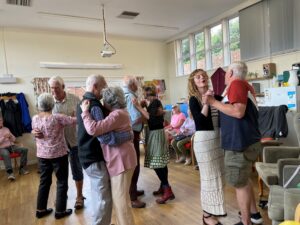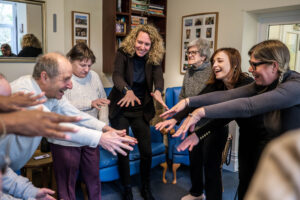Live Music Now musicians deliver thousands of performances for older people each year, all around the UK. These people usually tell us that they feel uplifted and happier, and their carers often notice the effects lasting for many days afterwards, even in the cases of people who have quite advanced dementia. It is important work, and very moving to see it taking place. But we are regularly witnessing a deep societal problem, which urgently needs to be addressed: chronic loneliness.

How many people are affected?
Loneliness is subjective, and can come and go. It can affect people living alone, or those surrounded by other people. We all feel lonely sometimes, but when this feeling persists over a long time it can become ‘chronic’. And it is clear that an increasing number of people are experiencing this.
There are currently more than 10 million people over 65, and this number is predicted to double by 2050. A study of loneliness in older Britons published in 2012 found that more than a fifth felt lonely all the time, and a quarter became more lonely over five years.
More than a third (39%) of people living alone, with dementia, said they feel lonely. Their reduced social confidence causes such people to stay at home, interacting less with the world. 12% of all older people say that they feel trapped in their own home, and 9% say they feel cut off from society (Age UK, 2013).

It’s important to note that it’s not just older people that are affected. The Mental Health Foundation’s 2010 report ‘The Lonely Society’ described loneliness as having reached ‘epidemic proportions’ amongst the whole population. It found that more than a third (42%) of British people have felt depressed because of being alone. Almost 5 million people say that the television is their main form of company (Harrop and Jopling, 2009). More recently, the charity Relate has conducted a study showing that 9% of the population feel that they don’t have a single close friend (The Way We Are Now 2014).
Why does this matter?
At a basic level, this matters because humans are social animals, at our happiest when we form strong relationships with others and interact regularly.
But there are serious health and economic implications as well.
The Mental Health Foundation’s 2012 report ‘The Lonely Society’ (see above) found that persistent loneliness “leaves a mark” via stress hormones, immune function and cardiovascular function with a cumulative effect. It alters behaviour, increasing people’s chances of indulging in risky habits, and plays a role in mental disorders such as anxiety and paranoia.
For older people, there is evidence to suggest that the risk of Alzheimer’s disease more than doubles for those experiencing loneliness (Wilson et al, 2007), although more research is needed in this area. Research has also shown that older people who are lonely are more likely to visit their GP and use more medication (Cohen, 2006), and more likely to enter residential care earlier (Russell et al, 1997). Loneliness can be twice as unhealthy as obesity, according to researchers who found that feelings of isolation can have a devastating impact on older people. Compared with the average person in the study, those who reported being lonely had a 14% greater risk of dying.
This matters because a huge number of people in our society are suffering, silently. It harms them in all sorts of ways, and is a great drain on their own health, and consequently several public services. These people could instead be playing a part in their communities. This affects us all.
What is already happening to address this?
In 2011, the ‘Campaign to End Loneliness’ was launched by five charities. It seeks to develop good practice, share resources and lobby for public policies to address this issue. Its excellent website contains many useful tools and advice, and links to research. They have just released a report that highlights good practice in this area.
For older people, the Alzheimer’s Society’s Dementia 2013 report was entitled ‘The hidden voice of loneliness’, and presented a picture of how those living with dementia are affected. Its vision for Dementia Friendly Communities could make a big difference in this area, but this will take time.
One of our partner organisations ‘Contact the Elderly’ is also concerned with tackling loneliness amongst older people, and organises Sunday tea parties around the country, for groups of 6 to 8 people.
More recently, the Joseph Rowntree Foundation has completed an excellent project to consider whether ‘neighborhoods’ can develop community activities to contribute to this area. Their work concluded that significant progress could be made, in a fairly short space of time, if local people can take ownership of the process (Neighbourhood Approaches to Loneliness 2014).
There is now a fairly wide understanding of the problem, but only a small number of practical solutions being explored.
What difference can music make?
There are two features of music that make it uniquely suitable for helping in this area.
Firstly, music can ‘reach’ people for whom normal communications are no longer suitable or possible. MRI scans demonstrate that music engages with several sectors of the brain, stimulating memories, and even encouraging new neuro-pathways to be formed. Our own projects have demonstrated this, as has a growing field of established medical research. Seeing someone who communicates very little suddenly sing along and laugh with their carers and friends is a very moving experience. Music performances have this egalitarian effect. People experience them together, whether they are staff members, carers, hospital patients or those living with dementia. It’s a wonderful way to build trust and friendships.
And secondly, music is something that appeals to everyone. There are a range of different preferences of course, largely relating to different genres and periods of music, but music itself has a unique ability to draw people together. A survey in 2009 concluded that each person in the UK owns an average of around 250 albums, during their lifetime. There are over 25,000 choirs in the country, and this number is increasing, particularly as television shows and medical evidence promote the benefits of singing. A musical activity has more chance of engaging with large number of lonely people than anything else.
What is Live Music Now going to do?
We are already running thousands of music performance around the UK, designed to engage with people in all sorts of challenging circumstances. Our programmes have been in development for 37 years, and we have over 300 musicians all around the country, for whom we provide specialist training and support.
Our ‘Songs and Scones’ project, for example, draws together around 80 people (who are typically living alone, in rural settings) to regularly listen to music together, and share food and conversation. We propose to run even more of these sessions, working with local charities, to involve as many people as possible.
Our standard approach to monitoring events and gathering feedback from participants has shown that taking part in Songs and Scones produces a range of benefits including improved social life, greater sense of community and belonging, enhanced mood and widened cultural horizons, all of which contribute to an overall sense of wellbeing. Through participation in social music programmes like Songs and Scones, we can help increase our resilience and ability to face the challenges of living independently as we age.
We are also developing a new approach to participatory singing, work in hospital wards, care home residencies and singing groups for adults with mental health issues.
The vital ingredient for us is that the music itself must be of the highest quality, in order to inspire and excite people. Wonderful music and musicians are one of the UK’s great assets and gifts to the world, but they are being heard by only a small proportion of the population. Everyone should have the right to experience transformative and beautiful music, and spend time with other people, regardless of whether they are mobile, isolated or lonely.
We'll leave you with a short film made by our Live Music Now team in North Yorkshire who have been running monthly Live Music Now concerts with Ryedale Carers since April 2013






